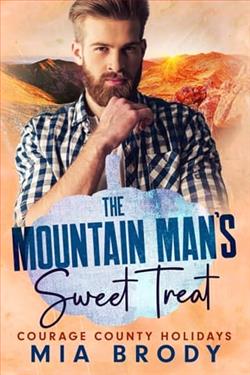Page 147 of The Armor of Light
Hornbeam stared at them walking across the bridge, bringing their children. They each had only one set of clothes but, like Kingsbridge mill hands, they dressed up with a bright scarf, a hair ribbon, a sash or a jaunty hat. Hornbeam had imported a hundred and twenty people from Ireland and it looked as if all of them were out for pleasure tonight.
He wondered how the locals would react.
The messenger led him to the Slaughterhouse, the largest of the waterfront taverns. A crowd of drinkers stood outside, enjoying the sun. The place was busy, and many of the Irish had already arrived and were quaffing from tankards. They were distinguishable by their subtly different clothes, tweed with random colours in the weave rather than the ordered stripes and checks of west of England cloth.
The messenger guided Hornbeam inside, where he spotted Riddick holding a tankard. Hornbeam said: ‘I should have anticipated this.’
‘Me, too,’ said Riddick. ‘They’ve just been paid and they want to enjoy themselves.’
‘But there seems to be no hostility between the locals and the newcomers.’
‘So far.’
Hornbeam nodded. ‘We should muster a squad of militia just as a precaution.’
Riddick spoke to the messenger. ‘My compliments to Lieutenant Donaldson, and will he be pleased to muster companies one, two and seven immediately, but hold them at headquarters pending further orders.’
The young man repeated the message accurately, and Riddick sent him off.
Hornbeam was worried. If there was trouble it would be blamed on the Irish, and there might even be pressure on him to get rid of them. That would leave him at the mercy of the damned union.
He needed to look around. ‘Let’s take a stroll,’ he said.
Riddick emptied his tankard and they went outside.
There was another, smaller pub a few steps away, its signboard a picture of a swan. ‘The White Swan,’ Riddick said. ‘Humorously referred to as the Mucky Duck.’
They looked inside. The strangers were sitting and standing with the locals, and no one was making trouble.
Street hawkers were selling hot and cold snacks: baked apples, nuts, hot pies and gingerbread. At the dockside a barge was unloading barrels of winkles, tiny edible sea snails that had to be prised out of their shells with a pin, and a man was already boiling them in a bucket over a coal fire. Hornbeam did not want any but Riddick bought a cone, sprinkled with vinegar, and ate them as he walked, dropping the shells on the ground.
He and Hornbeam toured the district. They looked into taverns, gambling dens and brothels. The pubs were all very basic, with crude home-made furniture. They mainly sold ale and cheap gin. The Irish would not be at the gaming tables: they did not have enough money, Hornbeam assumed. Bella Lovegood, who was getting older, was madam of her own place now, and four or five of the young Irish men were there, waiting patiently for a turn with a girl. There were no Irish in Culliver’s house, doubtless because it was too expensive for mill hands.
By the time they found themselves back at the Slaughterhouse, the sun was beginning to sink down river and the drinkers were getting noisier. The messenger was waiting to tell them that Lieutenant Donaldson had mustered the three companies. Riddick said: ‘Stay close to me now – there may be another message.’
The mood in the tavern was boisterous, but there was no sign of tension. Riddick got another tankard and Hornbeam a glass of madeira, and they took their drinks outside where the air was still warm but fresher. Hornbeam began to feel that things would be all right.
One or two people were becoming irritated with the children. They seemed especially energetic, racing around playing games of chase. Occasionally one would crash into a grown-up and dodge away without apology. ‘I wonder,’ Hornbeam said fretfully, ‘whether we should suggest that people keep their children under control or, better, take them home to bed.’
A gingerbread man appeared and sold thick slices of his sweet cake to the drinkers outside the Slaughterhouse. Hornbeam saw a boy of about eight snatch a piece from the hand of a young woman and stuff it straight into his mouth. But he was not quick enough, and the woman’s companion grabbed the child’s arm. ‘Little thief!’ the man shouted. The boy tried to pull away but could not escape the man’s grip, and he began to screech. People turned to look.
Hornbeam recognized the man holding the child as Nat Hammond, one of the young hooligans who patronized the Slaughterhouse. Hammond had appeared before the justices two or three times on assault charges.
A moment later an Irishman approached Hammond and said: ‘Leave little Mikey be.’
Hornbeam heard Riddick mutter: ‘Oh, damn.’
Hammond shook the boy and said aggressively: ‘Is this yours?’
The Irishman said: ‘You will let my boy go – or you’ll suffer the consequences.’
Riddick spoke to the messenger. ‘Run to headquarters and tell Donaldson to get the militia down here fast.’
The child Mikey was emboldened by the arrival of his father and he gave his captor a terrific kick. Hammond shouted with surpriseand pain, and smacked Mikey’s face, at the same time letting go of his arm. The child fell to the ground, bleeding from his little snub nose.
The father jumped at Hammond and punched him in the belly. As Hammond doubled over, the Irishman said: ‘Now see if you’d like to smack my nose, instead of a little boy’s.’
Riddick took Hornbeam’s arm. ‘Let’s stand clear,’ he said. Hornbeam complied nimbly.















